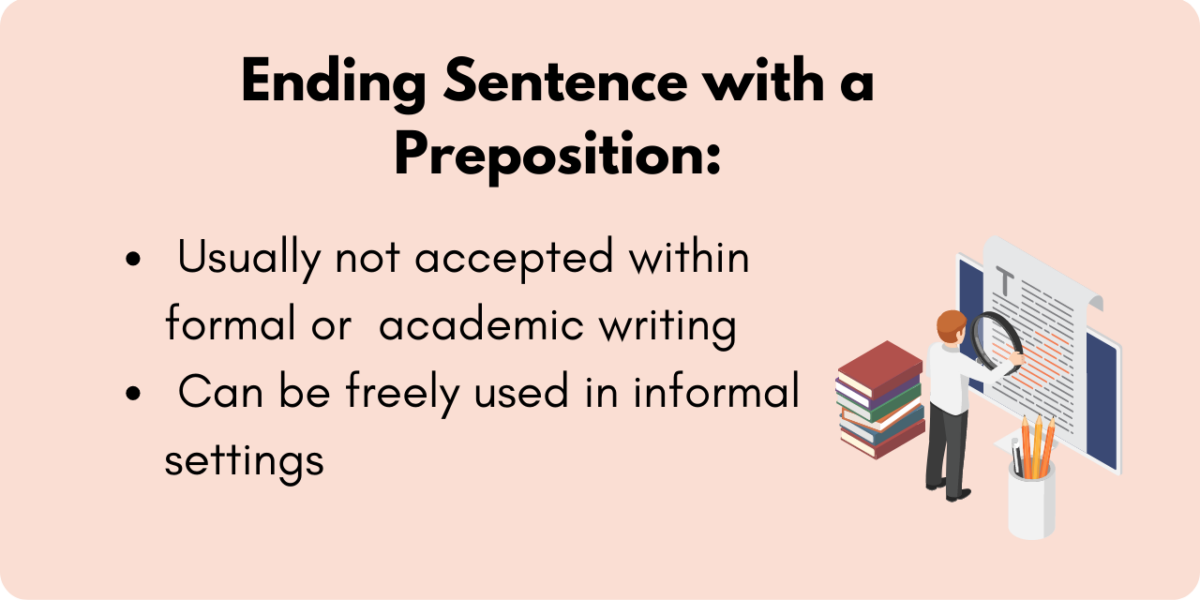Let’s discuss the main question of the day: is it allowed to end sentences with prepositions?
Most sources say you shouldn’t. However, there may be some situations in which it is acceptable or even the best option. Like with most other English grammar rules, the usage of prepositions can be pretty nuanced and relies mostly on your understanding of what rules are at play.
What are Prepositions?
To understand if you can end sentences with them, you first need to know what prepositions are.
In short, prepositions describe relationships between two distinct things, such as time or space. They usually indicate where something is located concerning another thing.
For instance:
- I am inside my house.
- She has been waiting outside for almost an hour!
One interesting thing to note about prepositions is that a prepositional phrase must accompany them. Likewise, they also require an object to work with, such as a noun. In standard sentences, the object should come after the prepositions are stated.
For example:
- I ate in [preposition] the living room [noun].
- He was found near [preposition] the library [noun].
Using Prepositions to End Sentences
As mentioned above, there isn’t a clear answer on when you can or cannot use prepositions to end sentences. In reality, the true answer is “sometimes,” as it relies on what other components are found within the sentence.
Ending sentences with prepositions is usually not accepted within formal or academic writing but can be freely used in informal settings.
When Not to Use Prepositions to End Sentences
As mentioned, you should not use prepositions to end sentences when writing formally or academically. Similarly to avoiding colloquial terms or emojis in formal writing, ending sentences with prepositions should be avoided.
Some common formal writing formats that you should not end sentences with prepositions include:
- Papers
- Essays
- Cover letters
- Work emails
- Formal Reports
- Customer services messages
Additionally, you should not use prepositions to end sentences if no object is involved. This rule also applies to prepositions in any part of a sentence; they simply require an object to function correctly. Without an object, they prepositions are formally known as dangling or hanging prepositions, and they are frowned upon.
When to Use Prepositions to End a Sentence
When communicating in an informal setting, ending your sentence with prepositions could be helpful. Most formal styles don’t fit right in informal settings. In fact, there are a lot of colloquialisms that use prepositions that you can use in your informal writing.
Additionally, if you are writing or speaking informally, a native English speaker will likely understand what you mean, even if you aren’t following all the rules of grammar.
Additionally, you can end your sentence with a preposition if it is in the form of a phrasal verb. Phrasal verbs act as verbs even though they can be formed with prepositions. Thus, ending your sentence with a prepositional phrasal verb is acceptable. Take this example:
- Don’t forget that you have to dress up.
Similar to prepositions, phrasal verbs also need an object. Thus, your sentence won’t sound good if you don’t have an object.
As a final reason, you can also end your sentences with prepositions if it simply sounds better. In other words, if doing so would improve your prose without taking away from what you are trying to say, it can be a great idea.
Many great writers and English speakers use prepositions as artistic sentence finishers- both in an informal and formal context.
In the end, prepositions (like with most English writing) aren’t a clear-cut issue; they have many facets and opinions, and each has its merit. Thus, don’t get too caught up in the preposition rules, especially if your sentence reads well!
Special Notes for Using Prepositions at the End of a Sentence
As you now know, if you are ending your sentence with a preposition, it requires an object; simple enough. But what would the case be if you were working with interrogative pronouns? Pronouns such as what, which, who, and whom can be found in sentences such as:
- Whom are you speaking to?
- Which building do you want to go in?
In cases such as this, where you are using interrogative pronouns to start, you should move the preposition before the object to make the sentence sound better. Think of this as a simple preposition rule that you should follow in most cases. For instance:
- In which building do you want to go?
- For whom are you speaking?
Again, there isn’t a 100% proper way to use propositions to end sentences. This rule also doesn’t apply to every interrogative pronoun, so do not worry if it fails! In the end, if you are having a lot of trouble with this, you can simply split your sentences into two to break the confusion.
Quick Review
As a bottom line, ending your sentence with a preposition is possible. However, it is a pretty nuanced topic and can require a lot of practice.
Most grammarians agree that you should only end with prepositions if you are writing or speaking informally. So, refrain from using them in your academic papers or reports.
Keep in mind that ending your sentences with a preposition removes it from the object, which can create a lot of confusion. Thus, you should only do it if you have a good reason!
Further reading: speaking of preposition, read Lynn’s article on cutting unnecessary prepositions “Cut Unnecessary Prepositions–But Not These.”







